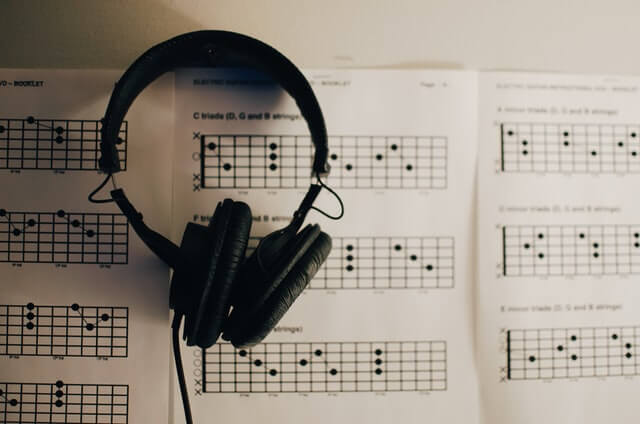Struggling to find the best book on guitar scales for your level and musical style?
From improving your technique and sound to making your solos more exciting, practicing scales on guitar have tremendous benefits. However, it’s no secret that learning or practicing scales can be a tedious task.
For this reason, we’ve handpicked some of the best books for learning guitar scales that prove scales don’t have to be boring and difficult.
Whether you want a book simply displaying all the scales in order or a thorough method book for learning to play scales and applying them to your solos, this list will help you choose the best book for your needs.
The Guitar Grimoire: A Compendium of Formulas for Guitar Scales and Modes
From soloing over chord progressions to understanding how music works, having a solid grasp of scales and modes is crucial to becoming a versatile player. This giant book of scales depicts every mode of nearly all the existing scales, including the exotic ones.
One important thing to know before buying this book is that it’s not a method book, which means it doesn’t include practical exercises or instructions on how to play those scales.
Rather, it’s an incredibly comprehensive reference book that equips you with the knowledge of hundreds of scales and where to find them on your fretboard. Therefore, you’ll need an additional method book if you’re self-teaching guitar to get the most out of this book.
If you only rely on this book to learn scales, you’re likely to feel lost as it’s not meant to teach you how to play the scales. It’s rather a fundamental resource that every guitarist should have in their library regardless of their level. Once you have this book, you can quickly open it and find any scale you want to enrich your playing without needing another reference book.
Although the intense knowledge in the book might be overwhelming for beginners, it’ll provide tremendous value as they progress to more advanced levels.
Overall, this book is very handy to have on hand, like most other books from the Guitar Grimoire series. With the value and practicality they provide, it’s no surprise that they are one of the most popular resources among guitarists from all levels.
The Guitarist’s Scale Book: Over 400 Guitar Scales & Modes
This is another comprehensive reference book for any type of guitarist, including more than 400 scales and modes. Other than major, minor and pentatonic scales in all keys, it also includes exotic and cross-stringing scales, along with tips on how and when to incorporate those scales into your playing.
What makes this book special is that it’s very beginner-friendly. The scales are arranged in alphabetical order and by category, so there is no need for music theory knowledge to find what scale you’re searching for.
It’s also well laid out, organized, and has an accessible language so that beginners can easily understand the concepts presented in the book.
As it’s more of a reference book, it’s good to use it as a supplement to a method book for self-teaching guitarists.
Guitar Scales Workshop: 3 in 1
We can all agree that learning scales aren’t the most fun part of playing the guitar. One of the reasons why most guitarists put off learning scales for years is that it feels like a daunting and boring task. And they’re not wrong, as most traditional teaching methods require meaningless memorization of patterns plus an understanding of dull theory.
Guitar Scales Workshop is here to revolutionize the traditional methods and make the scale learning experience easy, logical, and fun for all guitarists.
This all-in-one book is the combination of the three best-selling guitar scales books by the author at the price of two.
The first part of the book is dedicated to making you memorize the fretboard in less than 24 hours, which most people do in a couple of hours due to its effectiveness.
The second part teaches you one scale in a step-by-step method so that you can quickly master it and start soloing.
The third book is the final part in which the author provides you with more than 30 scales and lick ideas to explore.
It’s both a method and a reference book, hence one of the most comprehensive guitar scales books on the market.
Whether you’re a beginner or an experienced guitarist who never took the time to bother with scales, this book makes it incredibly easy and fun to learn and master the scales once and for all.
Guitar Chord, Scale & Arpeggio Finder: Easy-to-Use Guide to Over 1,100 Chords, 1,300 Scales & 1,300 Arpeggios
This book by Hal Leonard is perfect if you’re looking for a comprehensive reference book covering not only scales but also chords and arpeggios.
The book is so well laid out that it’s incredibly easy to find what you’re looking for. The basic instructions on music theory also make the concepts clear, which is especially helpful for beginner guitarists.
Overall, it’s a handy resource for any guitarist who wants quick, practical, and easy-to-understand references for scales, chords, or arpeggios.
Guitar Scales in Context
One problem with traditional scales books is that they teach scales in isolation without showing how scales connect to other musical structures. While presenting hundreds of scales to choose from, they mostly miss the essential points as to why, how, and when to play those scales.
This book aims to eliminate this common frustration among guitarists by putting scales into context and showing the wider picture of musical structures in which scales fit. Progressing through the book, you’ll start to have a deeper understanding of scales instead of painfully memorizing them. This understanding supported by the audio tracks will enable you to incorporate the scales into your playing effortlessly.
The backing tracks and easy-to-follow approach of the book also make the learning experience incredibly engaging and effective.
This book is best suited for players of intermediate level and up who want to take their playing to the next level. If you’re a beginner, I wouldn’t suggest getting this book yet as some concepts may confuse you.
If you’re a beginner looking for a book to learn scales, I’d suggest checking out beginner options on this list, which are plenty.
Overall, a fantastic book for guitarists who’ve passed the beginner level and are eager to explore scales in a unique and effective way.
Guitar Scales: Minor Pentatonic Soloing Connections
Minor Pentatonic scale is an essential component in guitar soloing as it’s the most common scale in rock, pop, and blues music. However, many guitarists are trapped in the same few box shapes, playing the same ideas over and over again.
This book aims to break you out of the pentatonic prison by providing unlimited soloing options and fresh ideas to incorporate into your playing.
It shows various licks in all five shapes of the minor pentatonic scale. This way, it allows you to think out of those few box shapes.
Studying this book, you’ll start to think not only horizontally but also vertically up and down the neck, which will open a lot of room for fluidity and creativity in your soloing.
This fantastic training book features useful scale exercises, licks, patterns, diagrams, and backing tracks to make the learning experience fun and engaging.
All in all, it’s an incredibly helpful book for guitarists who want to build musical and fluid soloing skills using the Minor Pentatonic scale.
Altered Scale Soloing For Jazz Guitar
The altered scale is an essential component in jazz music that is often poorly covered in jazz and scale books. However, mastering the altered scale can significantly unlock your creative potential and take your improvisation skills to a whole new level.
This incredible book by the legendary guitarist Mike Stern takes you through the altered scale step-by-step in a clear and easy-to-understand fashion. He shares his knowledge and secrets on altered scales to help you develop your unique creative jazz solos.
Starting with explaining the fundamentals of each altered jazz scale, the book offers many useful exercises along the way to reinforce the concepts and help you apply them to your playing.
This book is best for guitar players who already have experience in jazz and is eager to expand their horizons with the fresh ideas presented in the book. Non-jazz players can also benefit from this book as exploring altered scales will be a substantial contribution to their musical vocabulary.
In short, if you’re stuck in a rut with the same old scales and ready to move beyond your comfort zone, this book is a must-to-have!
Guitar Scales Handbook: A Step-By-Step, 100-Lesson Guide to Scales, Music Theory, and Fretboard Theory
The Guitar Scales Handbook is an excellent instructional book to learn and master guitar scales in a step-by-step, clear, and easy-to-understand approach.
What makes it unique is the video lessons that supplement the book. If you’re more of a visual learner, then the video lessons will be incredibly beneficial as they help you visualize concepts written in the book. The videos make learning the scales fun and easy for beginners, as well as visual learners.
While it’s suitable for beginners, a basic understanding of music theory might still be helpful to get the most out of this book. The information on scales is supported with music theory, which is helpful to reinforce the concepts though it might feel a bit overwhelming for a complete beginner.
In short, it’s not only one of the best books for learning guitar scales but also guitar theory step-by-step, which I highly recommend to guitarists of any level.
Patterns, Scales & Modes for Jazz Guitar
This is another fantastic resource for jazz guitarists or those who want to develop jazz soloing skills.
Related: 9 Best Jazz Piano Books For Any Level
In addition to scales and their different forms, the book features a great variety of arpeggios and jazz patterns to incorporate into your solos.
It’s an incredibly comprehensive and systematic book where each section builds on the previous one. It guides you from the basics to the more advanced material with easy-to-understand instructions and practical exercises.
First introducing you to the basic scale forms in jazz and their related arpeggios, the book then offers many exercises that help you apply the knowledge into your playing.
Because the book doesn’t have depictions for tabs, you need to read music at least at a basic level. I think it isn’t a drawback as trying to read notes even if you’re not good at it may greatly improve your sightreading skills.
All in all, it’s a must-have book for those who want to equip themselves with the essential tools for jazz guitar improvisation.
A Modern Method for Guitar Scales (Berklee Guide)
A Modern Method For Guitar Scales is an excellent resource to have for any guitarist learning scales. The highlight of this book is that it teaches many scale fingering options that you can apply to various musical contexts.
The book involves a lot of exercises to help you master the different fingering patterns across the strings. Other than exercises, you’ll find incredible graphical illustrations and scale etudes to reinforce the written concepts.
Like most Berklee books, it’s nicely laid out, organized, and easy-to-follow.
A Modern Method For Guitar Scales is an incredible supplement to anyone learning guitar scales, so I highly recommend adding this to your musical library.
Guitar Scales for Beginners: Learn to Solo Effortlessly!
One of the most comprehensive and instructive books on guitar scales, Guitar Scales for Beginners is a resource I cannot recommend enough.
This book aims to teach scales in a simple, practical, and engaging way, which it does incredibly well.
However, it goes far beyond simply teaching the scales. It provides theoretical explanations behind different types of scales, along with detailed instructions on how to play them. The book also deals with ear training, hand strength, and coordination, which are essential skills to becoming a good soloist and improviser.
As opposed to what its title suggests, I wouldn’t recommend this book to beginners. It’s best suited for guitarists who are already familiar with the fretboard and can move around the neck.
Overall, it’s a fantastic self-teaching resource on scales for intermediate and above players.
Fretboard Logic II – Chords, Scales, and Arpeggios
Fretboard Logic is a groundbreaking series of guitar instruction books that I think should be in every guitarist’s library. This book is the second volume of the series that focuses on the chords, scales, and arpeggios.
The entire series is based on the CAGED system in an easy-to-follow fashion to give you a solid understanding of the fretboard without overwhelming you with music theory.
This volume teaches you the entire fretboard with different patterns of scales, chords, and arpeggios. With the aid of the practical CAGED system, you’ll not only be able to play any scale at any position on the fretboard with ease but also chords and arpeggios.
I can’t recommend this book enough as it gives you a deeper understanding of the fretboard by following a practical and coherent method.
Indeed, I’m a huge fan of this series so I’d highly recommend getting the combined edition (Vol. I and II) instead of only Volume II. This combined edition is a terrific resource for players of any level aiming to master the fretboard once and for all.
Little Black Book of Scales
Little Black Book of Scales is a pocket-sized book for quickly checking scales, TABS, and fingerings, which is incredibly handy to have.
It involves hundreds of guitar scales in an easy-to-read and clear format, hence a helpful book to carry with you.
Scale Pattern Studies For Guitar: Classic Guitar Technique
If you’re a serious musician striving for a higher level of musical development, it’s one of the best guitar scales books you can get.
This book is based on the classical guitar technique, yet players of any musical style can also benefit from it.
The book features all the major, melodic, and harmonic minor scales, different scale patterns, and connections between these forms. While this vast catalog of scales is already outstanding and unmatched, what makes this book stand out most is the number of useful sight-reading exercises it involves.
Those exercises not only help you memorize the patterns easier but also greatly improve your sight-reading skills, which are essential to becoming a well-versed guitarist.
Serious Electric Bass: The Bass Player’s Complete Guide to Scales and Chords
If you’re a serious bass player looking for a book on scales, look no further. This comprehensive bass scales guide has everything you need to master the language of bass guitar.
The book covers a variety of scales, modes, and different arpeggio patterns with clear and simple explanations. This makes it an essential reference book to go back to as you progress to a higher level of skill and understanding.
It’s also a great practice book as it features exercises to help you better apply the theoretical information.
The fact that this book doesn’t show tabs means you’re expected to know sight-reading at least at a basic level. If you’re a bass player who doesn’t know how to read notes, then getting this book might be a great opportunity for you to improve this significant skill as well!


























